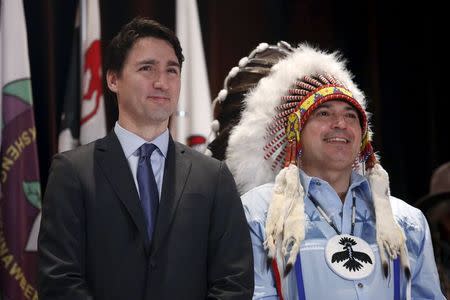Canada aboriginal head says development may be easier under new PM

By David Ljunggren OTTAWA (Reuters) - Canadian Prime Minister Justin Trudeau's move to reach out to aboriginal groups could make it easier for natural resource companies to complete major projects, some of which are stalled, a senior indigenous leader said on Wednesday. Trudeau, whose Liberals took power last month, told aboriginal chiefs on Tuesday he wanted to radically improve relations with the government, which were often tense under the former ruling Conservatives. He also pledged more funding for an indigenous population plagued by crime, ill-health and poverty, and stressed the importance of aboriginal rights. "We're totally optimistic and hopeful because the prime minister talked about building on a new relationship," said Perry Bellegarde, who heads the Assembly of First Nations (AFN), the umbrella group for the more than 600 aboriginal bands in Canada. Asked whether Trudeau's positive tone could make resource development easier, Bellegarde said as long as firms "respect inherent rights, treaty rights and indigenous peoples' involvement, there could be ways to work through some of these concerns." He noted that no major pipelines had been approved or built in Canada in recent years. "If you start involving indigenous peoples in the development and design of any major operation from start to finish, that's the way to go," he said in an interview. The key, he said, was for companies to forge good ties with indigenous peoples before breaking ground. "If that positive relationship is built first, I think things could be done easier," he said. Aboriginal groups - citing Supreme Court decisions as well as treaties signed with British settlers in past centuries - say they have significant rights over their traditional lands that Ottawa and resource companies often ignore. Two proposed pipelines - TransCanada Corp's Energy East and the expansion of Kinder Morgan Inc's Trans Mountain Pipeline - have been opposed by some aboriginal communities. Canada's new Minister of Natural Resources Jim Carr this week said Ottawa would give aboriginal groups more say in discussions over natural resource projects located on their territory, which should help pave the way for major pipelines and mines. Carr, speaking to Reuters, did not say whether this meant the government considered aboriginal groups would have a veto over projects. "We have the right to say 'yes' to projects and 'no' to projects. It's an inherent right," said Bellegarde. (Corrects name of body to Assembly of First Nations from Association) (Reporting by David Ljunggren; Editing by Andrew Hay)

